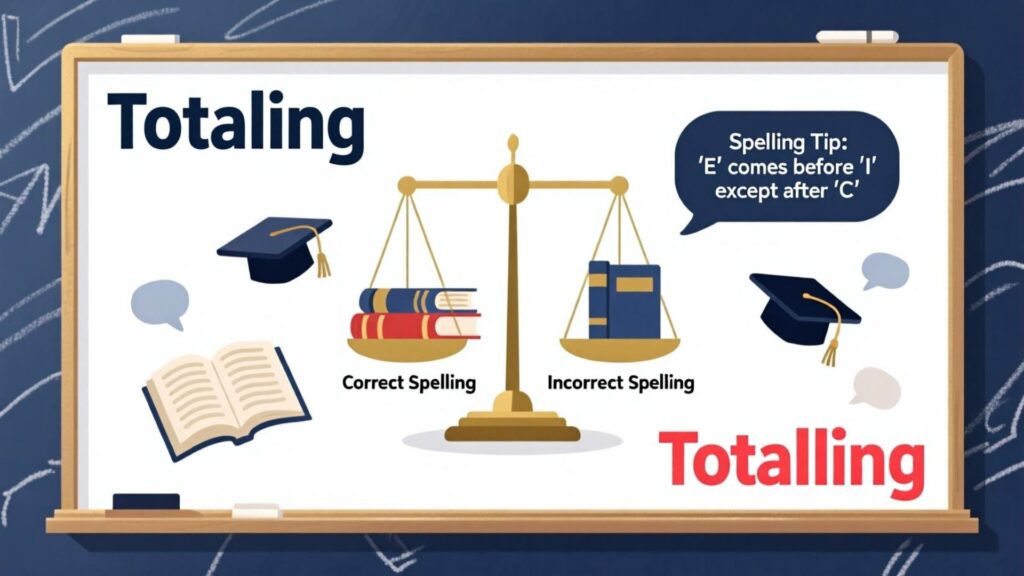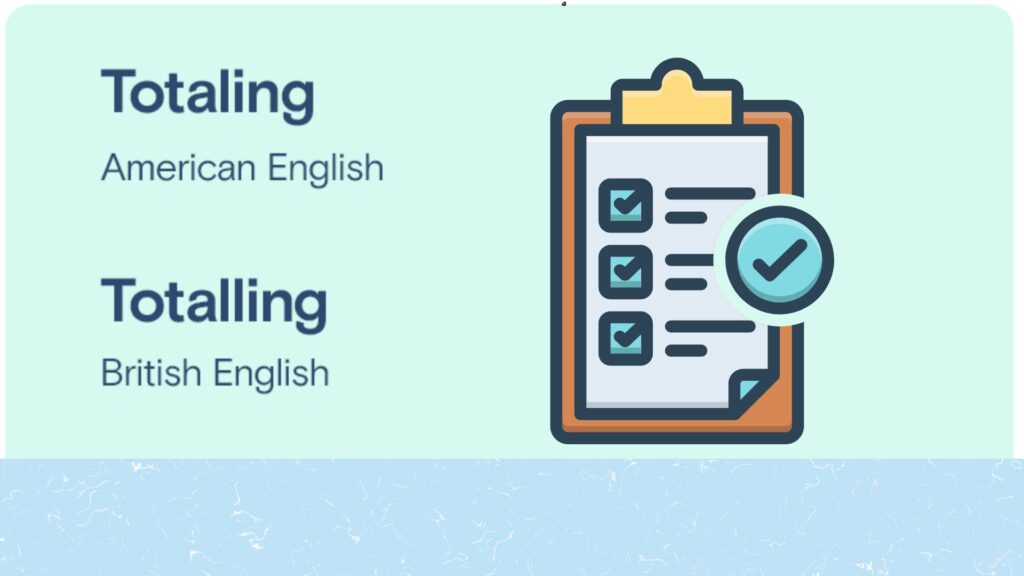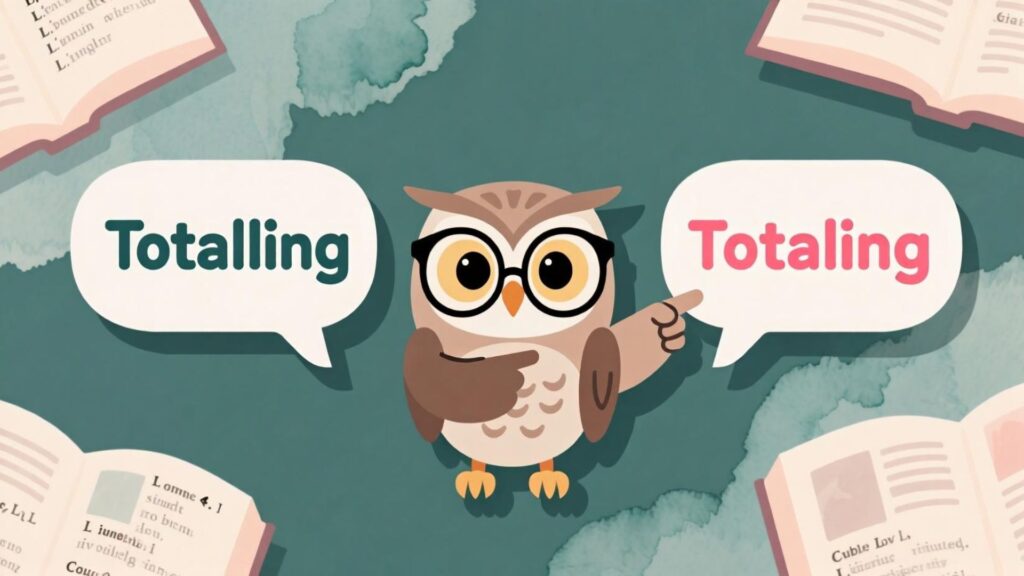When you’re writing and stumble upon the word totalling or totaling, you might pause. Which spelling is correct? Well, both are correct but it depends on where your readers are from. If you’ve ever seen similar spelling debates like travelling vs traveling, you already know this is about British vs American English spelling conventions.
This article clears up the confusion, explains the double ‘l’ rule vs single ‘l’ rule, and gives practical examples of totalling and totaling in real-world usage including emails so you can write with confidence.
Keyword + Intro Explanation

The debate between totalling vs totaling isn’t about grammar it’s about regional spelling variations. In British English, you’ll usually see totalling with a double ‘l’, while in American English, it’s totaling with just one.
So, if you’re adding up numbers or calculating a total and want to use the present participle, you need to pick the right spelling for your audience. Let’s dive deeper.
Simple Definition + Usage Overview
Before we argue over letters, what does this word even mean?
- Totalling/Totaling is the present participle of the verb “total”, meaning to add up numbers to find a sum or to amount to a certain figure.
- It’s commonly used in continuous tense:
- She is totalling the expenses for the trip.
- He is totaling the damages from the storm.
It can also work as a noun (the act of totaling the costs) or even an adjective (the totaling amount).
Clear Rules & Patterns
Why two spellings? The reason lies in English spelling rules:
- In British English, when a verb ends in a single vowel followed by “l”, and you add a suffix starting with a vowel (like -ing), you double the “l”.
- Example: travel → travelling → totalling.
- In American English, the same rule does not require doubling the “l.”
- Example: travel → traveling → totaling.
So, British = double “l,” American = single “l.”
✅ Quick Example:
- British: We’re totalling all your purchases for the receipt.
- American: We’re totaling all your purchases for the receipt.
Both mean the same thing. Just different spellings for different readers.
Bulleted Rules with Do’s and Don’ts
- Do use totalling if you’re writing for a UK, Australian, or Canadian audience.
- Do use totaling for American readers.
- Don’t mix them in the same document it looks inconsistent.
- Do follow your style guide (APA, MLA, or your company’s manual).
- Don’t assume one version is wrong they’re both correct in context.
Examples of Totalling in British English
Imagine you’re emailing a colleague in London about expense reports:
Email Example (British English):
Subject: Final Expenses for the Project
Hi Oliver,
I’m just totalling the receipts from last week’s meetings. The amount so far is £1,450, and I’ll share the complete report by tomorrow afternoon.
Thanks,
Sophie
Other British examples:
- The charity event is totalling over £10,000 in donations.
- He was totalling the points while we played the game.
Examples of Totaling in American English
Now, picture emailing a client in New York:
Email Example (American English):
Subject: Invoice Breakdown
Hi Jessica,
I’m totaling the service charges for your account this morning. The preliminary figure is $3,250, and I’ll send you a detailed invoice by the end of the day.
Best regards,
Daniel
Other American examples:
- The storm damage is totaling more than $5 million across the state.
- She’s totaling her expenses before submitting the reimbursement form.
Before/After Examples in Everyday and Formal Contexts

- Everyday British: I’m totalling the bill now, give me a sec.
- Everyday American: I’m totaling the bill now, give me a sec.
- Formal British: The finance team is totalling annual expenditures for the report.
- Formal American: The finance team is totaling annual expenditures for the report.
Common Mistakes & Fixes
- Mistake: Using totalling in an American business proposal.
- Fix: Switch to totaling if your audience is American.
- Mistake: Mixing both spellings in one document.
- Fix: Choose one and stick to it.
Memory trick:
- If you see British pounds (£) in the text, think double L for totalling.
- If you see American dollars ($), go with single L for totaling.
Quick Reference Table
| Audience | Correct Spelling |
|---|---|
| British English | totalling |
| American English | totaling |
Synonyms and Alternatives
Don’t want to overuse the word? Try:
- Adding up
- Summing
- Calculating
- Counting
- Aggregating
Example:
- She’s adding up the scores.
- He’s calculating the total expenses.
Related Spelling Differences (Travelling vs Traveling)
This is the same pattern as:
- travelling vs traveling
- cancelling vs canceling
- modelling vs modeling
American English favors simplification by dropping extra letters, while British English retains the double consonant in most cases.
Conclusion

So, should you use totalling or totaling? The answer depends on your audience:
- British English → totalling
- American English → totaling
Both are correct, so choose based on context. If you’re writing internationally, pick one style and stay consistent.
✅ Key Takeaways:
- Both spellings are correct regional preference decides.
- British = totalling, American = totaling.
- Use style guides for consistency in formal writing.
Final thought: The next time you’re totalling up your receipts or totaling your monthly budget, you’ll know exactly which spelling to use.
Bugti is the founder of Quoethint.com, a hub for English language tips, writing advice, and grammar guidance. With years of experience in English studies and a passion for clear communication, Bugti created this platform to make grammar and writing easy to understand for everyone.
